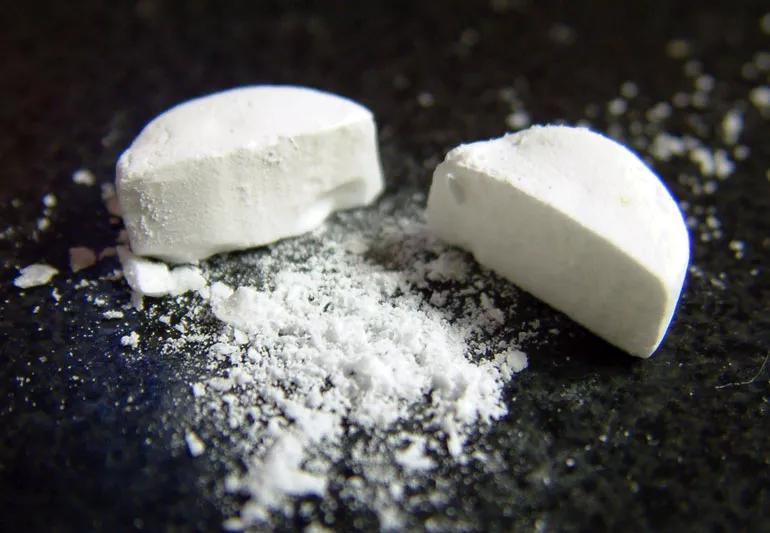Cutting pills is a normal — and potentially dangerous — practice

Image content: This image is available to view online.
View image online (https://assets.clevelandclinic.org/transform/7aba7df8-28b3-418f-b805-3ee4f1666e7c/pillSplitting-115814443_770x533_jpg)
Splitting pills
It’s not ideal to split a pill. But can it be done? Absolutely, in some cases — but it’s a process that can come with definite risks, primarily related to getting a correct dosage.
Advertisement
Cleveland Clinic is a non-profit academic medical center. Advertising on our site helps support our mission. We do not endorse non-Cleveland Clinic products or services. Policy
But the reality is that the slicing and dicing of medications happens … and it happens a lot. One study estimated that almost 25% of pills are split. The reasons why vary from the economic (saving cash) to the physical (difficulty swallowing a whole tablet).
So, if you’re going to do it, follow this advice: Ask before you make a cut and take safety steps to do it properly, advises pharmacist Alison Miller, PharmD.
“Splitting a pill can be dangerous,” says Dr. Miller. “That’s where the discussion needs to start.”
Tablets with a score line typically mean they can be split. This mark, or notch, offers assistance to make a clean cut — usually to make two even halves. “A score is the No. 1 thing to look for,” notes Dr. Miller.
Guidance can also be found within the gobs of text on medication labels or patient package inserts. The “How Supplied” section notes whether a pill has been approved for splitting by the U.S. Food and Drug Administration (FDA).
But don’t just assume it’s safe to split any pill with a score mark.
“It’s always best to talk with your pharmacist or doctor first,” cautions Dr. Miller. “A score line might indicate a pill can be split, but it doesn’t mean that you should.”
Advertisement
If there’s no score line on a pill, consider it a STRONG message that it’s not meant to be split. Medications that fall in this category include:
The right equipment is essential for splitting a pill. For more accurate splitting, look for a specialized pill cutter at a pharmacy or online market.
The most common design features a V-shaped pill holder and a retractable blade that presses down on the tablet. Make sure to do the downward cutting motion quickly. A slow press can make the pill crumble.
These nifty pill cutting devices — which often can be purchased for just a few bucks — are a much better option than, ahem, other more creative methods.
“I’ve had people tell me they’ve bitten pills in half or used their fingernails,” says Dr. Miller. “I’ve heard from people about using butter knives, too, which usually sends pill pieces flying all over the kitchen.”
Other splitting tips include:
How difficult can it be to evenly split a pill in half? Well, it’s tougher than you might think. One study found that almost 1 in 8 split pills were off by more than 20%. That’s not exactly top precision.
Dosage errors can be dangerous in either direction, notes Dr. Miller. Taking too much of a medication can lead to a potential overdose. Getting too little, meanwhile, can limit the intended benefits.
Advertisement
“Whenever you split a pill, you probably aren’t getting the exact dosage your prescription calls for,” says Dr. Miller. “That can have consequences.”
While splitting pills may not be encouraged, there are definite and understandable reasons why it’s done. The most common explanations include:
“There are times when you might need to split a pill,” says Dr. Miller. “But it’s always best to talk to your doctor or pharmacist first. There may be ways to get the proper dosage into one pill that works, which is preferred.”
Advertisement

Delivered every Tuesday!
Sign up for our Health Essentials emails for expert guidance on nutrition, fitness, sleep, skin care and more
It's a letter about the news!

Every two weeks once
Sign up for our Health Essentials emails for expert guidance on nutrition, fitness, sleep, skin care and more.
Learn more about our editorial process.
Advertisement
‘Rebound congestion’ happens when your body starts to rely on decongestant nasal spray
This diabetes med can treat obesity, but it’s not for people who just want to drop a few pounds
Learn how a little quiet time can make a big difference
Tips to help you get the most from your visit
Some types of expired meds may not be harmful, but they probably aren’t worth the risk
Options for sober social drinking are abundant, but be mindful about additives and triggers
If you’re not sure, talk to your healthcare provider — first
Learn what meds to give at which ages, and which ones to avoid
Type 2 diabetes isn’t inevitable with these dietary changes
Applying a hot or cold compress can help with pain
Pump up your iron intake with foods like tuna, tofu and turkey